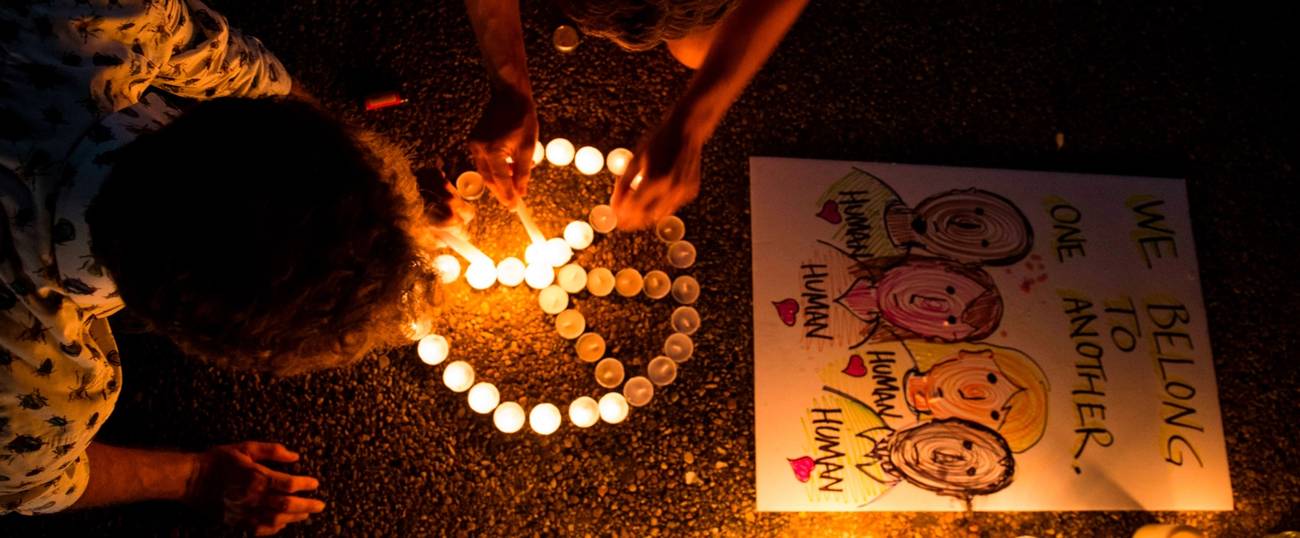In the Wake of Charlottesville, Orthodox Judaism’s Silence is Deafening
Why are the rabbis who were so vocal about the Iran deal so quiet when Americans are attacked on the streets by Nazis?




It was January 4, 1861, and President Buchanan called for national day of fasting to meet the challenge of the Secession Crisis. In New York City, Rabbi Morris Jacob Raphall took to his pulpit at Congregation B’nai Jeshurun. The Orthodox rabbi declared in no uncertain terms that he was “no friend to slavery in the abstract” and even less “to the practical working of slavery”, but the purpose of his sermon was not to expound on his personal feelings and opinions, but “to propound to you the word of G-d, the Bible view of slavery.”
The good rabbi’s conclusion? The institution of American slavery was perfectly legitimate and sanctioned by the Bible. As Raphall himself put it, “I grieve to find myself saying a good word for slavery, but God and the truth must prevail!”
It was, sadly, quite the specious argument, buttressed by mental and theological gymnastics, and it completely glossed over the crucial fact that Biblical slavery was a very different institution from American slavery. The latter, for one, was predicated on capturing and importing Africans, yet according to Torah law, one who kidnaps someone and then sells them receives the death penalty (Exodus 21:16). The treatment of slaves was brutal, often occurring in loss of limbs or death, the kind of abuse for which, according to the Torah, a slave-owner would be severely punished (Exodus 21:20). A maimed slave, the Holy Book tells us, is to be set free if maimed by his master (Exodus 21:26,27). And on the issue of runaway slaves, the Torah is clear that one cannot return them to their captivity (Deuteronomy 23:15).
None of that mattered to the influential Rabbi Raphall, and his comments remain as a black eye on Orthodoxy’s track record for being on the right side of history in this country. Sadly, not much has changed throughout the decades. The only Orthodox anti-slavery religious figure was Rabbi Sabato Morais, and during the Civil Rights movement, the closest Orthodox Jews have to an Abraham Joshua Heschel is Emanuel Rackman. If you haven’t heard of him, you’re proving my point.
Unfortunately, it seems the same complacency is at work today. There are some outliers, of course, like Rabbi Shmuely Yanklowitz who, as a graduate of Yeshiva Chovevei Torah, is part of an Open Orthodoxy that the rest of the Orthodox world has gone to great lengths to banish and denounce from being part of the fold. But they’re few and far between. From the rest of the Orthodox leadership, all we hear these days is a deafening silence.
Before you protest that you’ve seen no such evidence of Orthodox Jewish complacency in the face of Charlottesville, please, enlighten me on what you have seen? On Friday, for example, T’ruah, a group of rabbis for human rights, sent out an email linking to a letter to be signed specifically by “rabbis, cantors, and rabbinical and cantorial students” in solidarity with Charlottesville before any violence had even occurred. In addition to that, several T’ruah-affiliated clergy descended on Charlottesville in a counter-protest. As far as I could tell, no Orthodox rabbis, certainly no prominent ones, were among their ranks. By contrast, the statement by the Orthodox Rabbinic Council of America, written after the violence claimed three lives, was just two paragraphs long and lacked any real outrage. The statement from the Orthodox Union, the other large representative body of American orthodoxy—written three days late—reads nearly identically. Agudath Israel, the organization that represents America’s ultra-Orthodox community, is still currently silent.
Which, as a Jew of color, leaves me a little baffled.
Where’s the verve and fire and mobilization the same rabbinic organizations sounded when denouncing Obama’s Iran deal? Just one day after Obama struck the deal with the Iranians, the RCA and the OU released a joint manifesto decrying potential threats halfway across the world. Why it would take them three times as long to respond when actual Nazis are tromping around American streets and murdering people, and why that response was no longer than a few brief paragraphs, is a mystery.
And where’s the outrage I personally witnessed in Brooklyn, when President Obama’s name was removed from the weekly prayer for the government after the president enforced what has been White House policy concerning Israel since 1967? Where’s all the tut-tutting that occurred at kiddishes when people who never supported Black Lives Matter in the first place vehemently announced that they would not support BLM in the wake of the Movement for Black Lives’ “anti-Israel” platform? Is the Orthodox community sincerely more riled up about groups marching to say that Black lives matter, but strangely quiet when groups march saying that our own Jewish lives specifically don’t?
This failure to stand up to the climate of hate and intolerance must end. Because soon, it may be too late to do anything at all. I’m not asking everyone to rally around Democrats. Be your Republican, conservative, Independent, or even Libertarian selves. But understand that this is a moment, and a crisis, that transcends all of those ideological boundaries, and the ability to recognize and stand against, well, evil, should be something that inherently makes us human, let alone Jews of any stripe.
So, for Moses’ sake, my Orthodox Jews, let’s be on the right side of history this time. Just this once.
**Correction: An earlier version of this story erroneously claimed that Rabbi Marvin Hier had failed to issue a statement denouncing the murder in Charlottesville. That is not the case, and we apologize for the inaccuracy.**
MaNishtana is the pseudonym of Shais Rishon, an Orthodox African-American Jewish writer, speaker, rabbi, and author of Thoughts From A Unicorn. His latest book is Ariel Samson, Freelance Rabbi.